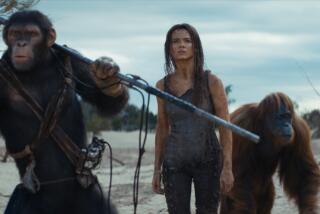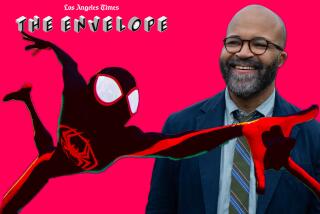Novice Gets Crack at ‘Apes’ Sequel
Don’t get him wrong: Adam Rifkin is thrilled about his contract with Fox to write and possibly direct the next “Planet of the Apes” sequel. He knows it’s not often a 22-year-old novice gets a shot at a major studio film. But he’s dead serious when he says he’s worried about becoming too commercial.
“I also want to do the kinds of projects that enable me to express myself as an artist,” Rifkin says, without a trace of irony in his youthful voice.
Rifkin is one of those rare success stories--a young film maker who caught the attention of Hollywood by sheer force of talent--and a healthy dose of luck. He has the kind of rich imagination that will no doubt take a battering from Hollywood’s commercial machinery as he matures.
“Adam is a cartoon genius walking through real life,” says Cassian Elwes, who produced Rifkin’s first film, “Never on Tuesday.” Rifkin may have described himself best when he listed his two heroes as Dr. Seuss and Federico Fellini.
“Never on Tuesday,” a sexy but ultimately feminist comedy that Rifkin made with $800,000 put up by private investors, caught the attention of Fox executives when he was only 20 years old. While they considered the film “too small” (a reference to both its budget and audience appeal) for a major-studio release, they did offer Rifkin a consolation prize: a chance to be the writer-director who revives the popular “Planet of the Apes” series.
The original “Planet of the Apes,” released in 1968 and starring Charlton Heston and Roddy McDowell, is considered a piece of classic science fiction. But the four sequels steadily declined in quality until Fox finally stopped making them in 1973. Now the studio, eager to revive the series, has hired Rifkin to write a screenplay. Under his contract, Fox also has the option to hire him to direct.
Craig Baumgarten, the former Fox executive who signed Rifkin, recalls that the young film maker was a strong talent who also happened to be in the right place at the right time. Fox liked the idea of reviving the series, but on a modest budget: Rifkin was young, hungry and cheap. More importantly, he had enormous potential. “He has an interesting, off-beat sense of humor,” says Baumgarten, “and he could tell a story.”
Baumgarten came to that conclusion after seeing “Never on Tuesday,” in which Claudia Christian--last seen in “Clean and Sober”--stars as a California bombshell who gets stranded in the desert with two Ohio teens (Andrew Lauer and Pete Berg) who can’t believe their good fortune.
“Never on Tuesday” also packs some surprises in its skeletal cast: Charlie Sheen, Emilio Estevez, Judd Nelson and Nicolas Cage all make uncredited cameo appearances. So do comic Gilbert Gottfried of MTV and Cinemax fame, and Cary Elwes, star of “The Princess Bride” and brother of “Never on Tuesday’s” producer Cassian Elwes.
By contract, these cameo appearances cannot be advertised--a restriction that has hurt the film’s search for a theatrical distributor. “They did it as a favor,” says Elwes, who recruited the young stars, all of them friends. “It would be unfair to the audience” to advertise their brief, and often well-disguised, appearances. For their work, each of the cameo actors was paid $360.
While the film is still in search of a theatrical distributor in the States, its private financial backers fully recouped their investment by selling the video rights to Paramount and the foreign rights to an overseas distributor.
Rifkin grew up in Chicago, the son of airline pilot Bennett Rifkin and his wife Michelle, a TV writer who is now at work on a screenplay in Hollywood. As a teen-ager, he landed jobs as an extra in film productions that came through Chicago: “Bad Boys,” “Risky Business” and “Sixteen Candles” among them. He attended Chicago’s Academy for the Visual and Performing Arts; he wrote children’s plays and sold some of his exotic cartoons and drawings to publications.
Rifkin attempted to take the traditional route to Hollywood, which probably would have landed him at studio doorsteps at about the age he could legally drink a beer. But when he applied to USC’s film program, he was rejected. He attended classes at USC for a year, hoping to reapply to the film school. For some reason, he never did. Instead, he dropped out and began writing screenplays. By the age of 19, he had written six of them, including “The Dark Backward,” a bleak and absurd story about a three-armed comic.
“Please do not try to rationalize that which seems bizarre,” Rifkin warns readers in a cover note. “It is meant to be.”
With “Backward” and his other scripts under his arm, Rifkin began calling on Hollywood studios. He got his break in the MGM parking lot when he overheard Elwes and his producer colleague, Brad Wyman, talking to another young film maker. Rifkin asked the pair to read “The Dark Backward.”
“It was one of the darkest scripts I’ve ever read,” recalls Elwes. But the producer was impressed enough to ask Rifkin to take a stab at a more commercial project. “Adam showed up three days later,” Elwes says. “He hadn’t slept and he was totally disheveled.” He also had a finished copy of a workable, original script under his arm--”Never on Tuesday.”
Elwes himself is only 28 years old. He produced “Oxford Blues,” starring Rob Lowe and Ally Sheedy, when he was 24, and has been churning out films ever since. Elwes specializes in working with first-time directors, but none as young--or demonstrating as bizarre an imagination--as Adam Rifkin.
When he’s not at work on his screenplay for “Planet of the Apes,” Rifkin is exercising that imagination of his--without much restraint. He is now at work on a totally improvised film about two mismatched sisters--portrayed by Claudia Christian and Valerie Breiman--who have conflicting recollections about their childhood. Charlie Sheen will narrate with original poetry that he has written.
But don’t look for “A Tale of Two Sisters,” produced on a shoestring $70,000 budget from Vista Street films, at the local shopping-mall theater anytime soon. This is not commercial fare.
Rifkin recently spent an afternoon with the LAPD explaining to officers that the aborted fetus in his film was actually a rubber doll, not a human. (A developing lab had turned over Rifkin’s photo of the doll to the police.) “Actually, I was kind of hoping they’d arrest me,” Rifkin confesses. “It would have been great publicity for the film.”
He may be new to Hollywood, but this guy’s a quick learner.
More to Read
Only good movies
Get the Indie Focus newsletter, Mark Olsen's weekly guide to the world of cinema.
You may occasionally receive promotional content from the Los Angeles Times.










